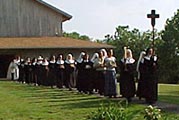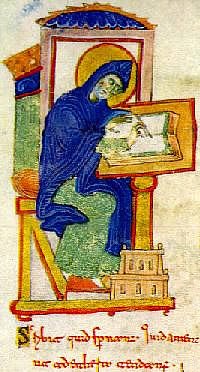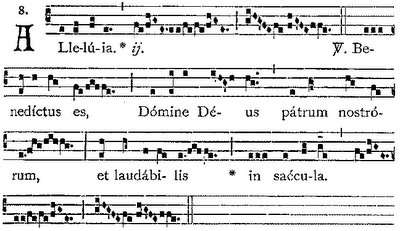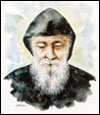
I
n the appropriately named town of Bethlehem in Connecticut the Abbey of Regina Laudis can be found. These are Benedictine Nuns following the Divine Office as prescribed by St. Benedict. The Office begins at about 2:00 A.M. with the nuns rising to sing the Office of Matins.  Yes, that is AM! Going back to bed, they rise early to sing Lauds followed between their daily chores by Prime, Terce, Sext and None. At some time in late afternoon before supper there would follow Vespers and then just a few hours later before bed, Compline.In its compromise to the modern world, the Church’s Liturgical “periti” renamed and restructured the Divine Office in the early 1970’s as the “Liturgy of the Hours.” This much reduced form of the Divine Office includes the Morning Prayer (Lauds), Evening Prayer (Vespers) and Night Prayer (Compline).
Yes, that is AM! Going back to bed, they rise early to sing Lauds followed between their daily chores by Prime, Terce, Sext and None. At some time in late afternoon before supper there would follow Vespers and then just a few hours later before bed, Compline.In its compromise to the modern world, the Church’s Liturgical “periti” renamed and restructured the Divine Office in the early 1970’s as the “Liturgy of the Hours.” This much reduced form of the Divine Office includes the Morning Prayer (Lauds), Evening Prayer (Vespers) and Night Prayer (Compline). In yesterday’s Hartford Courant, writer William Weir discovers the nuns and their office and the Divine sounds of the chant. More and more we can see the secular world taking notice of this beautiful tradition, in no small way due to the election of Benedict XVI. Prior to his election as Pope, Cardinal Ratzinger’s views on liturgy, polyphony and chant were well known. At some point very soon the Pope must respond to last years’ Synod on the Holy Eucharist. The report from the Commission was received by the Holy Father in June. Presumably, he has been using part of his time at Castel Gondalfo to ponder his response.Whether by accident or design (and in these matters, there are no coincidences) a convergence of issues all related to the liturgy is near.The Vox Clara Commission must soon complete its work on the ICEL translation of the Roman Missal for the English speaking world. A translation more literal from the Latin original and poetic will be the result.While Bishop Fellay of the SSPX has said just recently that there has been no action on the reunification of the Society and that it may take “years,” Benedict has made church unity a major goal of his pontificate. Where else to start than with traditional Catholics?
In yesterday’s Hartford Courant, writer William Weir discovers the nuns and their office and the Divine sounds of the chant. More and more we can see the secular world taking notice of this beautiful tradition, in no small way due to the election of Benedict XVI. Prior to his election as Pope, Cardinal Ratzinger’s views on liturgy, polyphony and chant were well known. At some point very soon the Pope must respond to last years’ Synod on the Holy Eucharist. The report from the Commission was received by the Holy Father in June. Presumably, he has been using part of his time at Castel Gondalfo to ponder his response.Whether by accident or design (and in these matters, there are no coincidences) a convergence of issues all related to the liturgy is near.The Vox Clara Commission must soon complete its work on the ICEL translation of the Roman Missal for the English speaking world. A translation more literal from the Latin original and poetic will be the result.While Bishop Fellay of the SSPX has said just recently that there has been no action on the reunification of the Society and that it may take “years,” Benedict has made church unity a major goal of his pontificate. Where else to start than with traditional Catholics? Can we hope that the “Reform of the Reform” so often talked and written about is not that far away?The Nuns of Regina Laudis know something about Gregorian Chant and its relationship to prayer, contemplation and worship. Now the readers of the Hartford Courant know, we can only hope (and pray) that soon the Catholic in the pew will find out what these Benedictines never forgot.Gregorian chant signals return to traditionBy William Weir Hartford CourantBETHLEHEM, Conn.
Can we hope that the “Reform of the Reform” so often talked and written about is not that far away?The Nuns of Regina Laudis know something about Gregorian Chant and its relationship to prayer, contemplation and worship. Now the readers of the Hartford Courant know, we can only hope (and pray) that soon the Catholic in the pew will find out what these Benedictines never forgot.Gregorian chant signals return to traditionBy William Weir Hartford CourantBETHLEHEM, Conn. – On a recent Monday at the Abbey of Regina Laudis in Connecticut, about 35 nuns gather in a dim chapel to chant, as they do every day at noon. Making their way through Psalm 118, the nuns sit or stand; some face different directions, while others bow steeply. Throughout, their voices remain in unison.
Pope Benedict XVI would approve. After a concert of 16th- and 17th-century music recently, the pope said he would prefer to hear Gregorian chant and other traditional types of music play more of a role during Mass. That’s good news for the cloistered nuns at the Bethlehem abbey, which is known around the world for its devotion to Gregorian chant and is one of the few places where it is sung with such frequency and intensity. The nuns sing seven times a day; some interrupt their sleep to chant at 2 in the morning.
But the pope’s comments also raise certain questions: What is sacred music supposed to sound like? And what’s wrong with new music in church?
It’s a debate that has raged since 1963, when Vatican II reforms brought contemporary music to Catholic churches. Just as the Latin Mass almost immediately disappeared amid attempts to modernize, chants gave way to guitars and snappy folk tunes. The new music helped fill pews, but it left church conservatives and formally trained musicians reeling. How could the church that brought about Gregorian chant, polyphony and musical notation – all profound influences on Western music – be the same one leading sing-alongs of “Love Is Colored Like a Rainbow” and songs from hit musicals?
What, bemoaned the purists, had the folkies wrought?
Going to church, critics say, should not sound like shopping at the mall or driving your car. They charge that “liturgical pop” is spiritually bereft and demands nothing from the churchgoer. It’s friendly, pleasant and easy, they say. They mean that in a bad way. Understanding God is hard work, the argument goes, and similarly, music in church should challenge us. A sermon that says only what people want to hear would lack moral authority. The same goes for music.
“There’s a sense of mystery and religious atmosphere that seems to be lost in the new days,” says Scott Turkington, the choirmaster at St. John the Evangelist Roman Catholic Church in Stamford. “The fact is that the older music is better. Ask any serious musician, and he’ll agree with that.”
The chants sung at Regina Laudis are more than 1,000 years old. But Sister Elizabeth Evans says “old” doesn’t mean “irrelevant.”
Sister Elizabeth, 46, was a corporate securities attorney and law professor before she came to the abbey in 1997. Each of the nuns is assigned certain responsibilities; hers are music and dairy. Sitting in a small room behind a wooden screen (which symbolically separates the nun’s world from the visitor’s, although there’s enough space to shake hands), Sister Elizabeth remembers stumbling onto the sound of chant when she was 14. To her, it was anything but off-putting. She played it for her friends, who were equally taken. “And I mean, these were 14-year-old gum-chewing delinquents like myself,” she says.
To the untrained ear, the unaccompanied chant named after Pope Gregory the Great can sound emotionally muted, droning at times and otherworldly. That it’s sung in Latin doesn’t help.
But to Sister Elizabeth, it sounds more recognizably human than any other music, down to earth and in tune to the rhythms of life. It’s based on the Scriptures, after all, which are filled with human foibles.
She says chant is like blues legend Muddy Waters – a comparison that conjures the improbable image of nuns chanting “Baby, Please Don’t Go.” She explains that both have a certain earthiness and deal with the nitty-gritty of life.
What they chant depends on the time of the day (the morning lauds, for instance, often celebrate beginnings and creations; at noon, they chant the sext, which deals a lot with chasing down noonday demons). Subjects also change along with the seasons. Lately, they’ve sung about taking in harvests, filling storage houses and other day-to-day concerns.
So if chant is like Muddy Waters, what’s contemporary Christian music?
“Donny and Marie,” Sister Elizabeth says, laughing.
© 2006 Journal Gazette and wire service sources. All Rights Reserved.http://www.fortwayne.com








